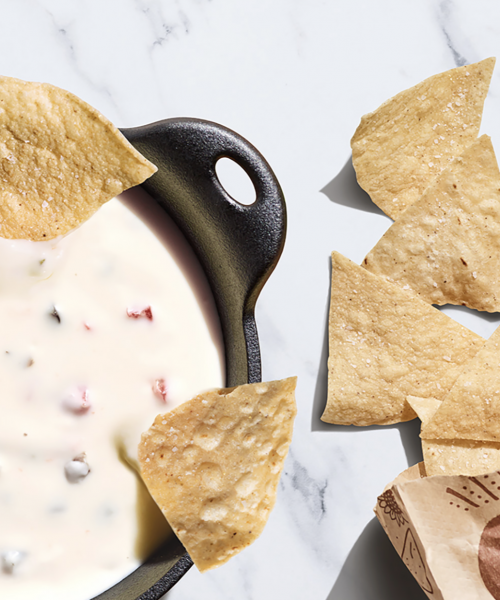By Jelisa Castrodale | FoodAndWine.Com
Troy Warren for CNT #Foodie
MSCHF art collective created the trio snacks to mimic ingredients that are banned in America.
All of us have reached into a bag of potato chips and shoved a handful straight into our mouths without giving too much thought to how they were developed or what kind of artificial flavorings have been assembled into Sour Cream & Onion or Flamin’ Hot Dill Pickle. But when you get your first taste of Illegal Chips, their creators hope that you’ll consider what you’re eating — and what you’re not.
The three ultra-limited edition flavors of Illegal Chips are the latest drop from MSCHF, the New York-based art collective who have done everything from putting an actual pizza inside a skateboard deck to collaborating with Lil Nas X on the now-infamous “Satan” shoes that your grandma is still freaked out about. For Illegal Chips, MSCHF turned their attention to the food we eat — and the food that the government prohibits us from eating.
Illegal Chips live up to their name: all three flavors represent things that MSCHF says are banned in the United States, including horse meat, Italy’s Casu Marzu “maggot cheese,” and fugu, the potentially poisonous pufferfish that is (carefully) served as sashimi, primarily in Japan.
“We selected flavors that could complement each other: surf and turf and dairy, essentially,” Daniel Greenberg, MSCHF’s Chief Revenue Officer, told Food & Wine. “We did consider plenty of other foods. The macabre French preparation of ortolan was another top contender.” (Ortolan, a tiny songbird that is eaten whole, has been illegal in France since 1999 — although they’re still occasionally served at secretive dinners, and the high-dollar dish has been featured on Billions and Succession.)
Although many of MSCHF’s drops have a cheeky kind of humor — like mixing an original $20,000 Andy Warhol drawing in with 999 forgeries and selling all of them for $250 — they’re always providing social commentary with their well-packaged products. They’ve done the same with Illegal Chips, providing an accompanying “Manifesto” that highlights the seemingly arbitrary notion of deeming some food “illegal,” while suggesting that advances in food science (and artificial flavors) could allow us to “taste” pretty much any animal we want without participating in the often taboo act of, you know, actually eating it.
“Horse in particular highlights the arbitrary nature of food prohibitions,” Greenberg explained. “All of our international contacts were surprised by this flavor, because it is a not-uncommon meat in most parts of the world. Here, however, it’s perhaps the flavor people react to most strongly.”
He’s not wrong: in 2017, acclaimed Pittsburgh restaurant Cure welcomed a group of Canadian guest chefs who prepared a one-night-only Quebecois menu that included horse tartare. The response to the meal was overwhelmingly negative, with some online commenters calling it “revolting,” and others launching a petition asking Pennsylvania governor Tom Wolf to ban the dish from ever being served in the state again. (The USDA warned Cure that if they illegally brought horse meat into the country again, it could face criminal prosecution.)
Although MSCHF says that eating horse has been “banned since 1847,” that’s not entirely accurate. According to The Atlantic, horse steaks weren’t uncommon during beef shortages brought on by World War I, and after the war, the Department of Agriculture was allowed to officially inspect facilities that processed horse meat. Horse meat was also available in Navy commissaries until the early 1980s, and the last three horse abattoirs — in Texas and Illinois — didn’t close until 2006 and 2007, respectively.
The USDA will not inspect any facility that processes horse meat, and a 2019 omnibus spending bill again stipulated that federal funds could not be spent to inspect horse slaughterhouses. (All that said, if you want to source your own pesonal horse, you can do so — you just may not want to put those pics on Instagram.)
As for developing the chips themselves, Greenberg said that the process started well over a year ago. “Doing anything that involves food is slow. It’s a regulated space [and] something that MSCHF does not traditionally play in,” he explained. “We also ran into supply chain challenges due to our unorthodox chip seasonings. At times, we were basically exhausting the available supply of certain components.”
They also collaborated with self-described “food guy” Josh Scherer, the host of Mythical Kitchen, to perfect the Fugu chips. “Josh is the master of weird foods, and is someone that actually has tried some of these foods for real,” Greenberg said. “It was a no brainer. And in terms of the process, [Scherer] helped guide the flavor profile of fugu.”
MSCHF sent me all three versions to try, and I can say that the horse chips taste like… straight-up sorcery. They have a rich, meaty flavor that somehow tricks every one of your tastebuds into believing that they’ve just had a forkful of actual cheval. (I have eaten horse on several occasions, in France, Iceland, and Italy, but have not sampled casu marzu or fugu — at least not yet — so I can’t compare those to the real thing.)
If you want to try the chips, they’re available while supplies last on MSCHF’s website. You’ll get all three flavors, plus one randomly selected fourth bag, for $12. It could be the opportunity to “try” an exotic food that isn’t readily available in the U.S., or it could just make your snack drawer look extra interesting. MSCHF would probably be alright with either outcome.
“There’s a passage in Plutarch’s Morals in which he describes human hands as ‘curious and artificial,’ which sounds like a put-down to modern ears,” Greenberg said. “But, that pair of words is meant in the sense of ‘seeking knowledge’ and ‘making with artifice.’ When we say that Illegal Chips are made to revel in the possibilities of ‘artificial’ flavoring, we mean it in this same manner.”
In Other NEWS



































